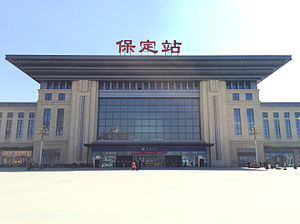Baoding railway station
This article has multiple issues. Please help improve it or discuss these issues on the talk page. (Learn how and when to remove these messages)
|
38°51′42″N 115°28′28″E / 38.86167°N 115.47444°E
 Baoding Railway Station (West Square) | |
| General information | |
| Location | China |
| Platforms | 8 |
| History | |
| Opened | 1899 |


Baoding Railway Station (Chinese: 保定站) is a railway station located in Hebei Province, People's Republic of China. It serves the Jingguang railway, and is currently administered by the Beijing Railway Bureau. It is currently a Class 1 station. About 120 trains stop at this station every day.
History
In April 1897, construction of the Lugou Bridge–Baoding section of the Luhan Railway (also known as Jinghan Railway, now the northern section of Jingguang Railway) began. Lugou Bridge, precisely 20 km away from the City of Beijing, was chosen as the starting point of the railway because the Empress Dowager Cixi forbid the construction of railroads within 20 km of the City of Beijing. This section of the railway, called the Lubao Section, was 132.7 km long, and was the first section of the Luhan Railway. Tracklaying was completed in January 1899. On 22 January 1899, Baodingfu Station (保定府站) was opened, and on 1 February, the section of the railway began operation. The station consisted of a waiting hall, a ticket office and a simple footbridge for passenger service; it also consisted of a storeroom, platform and tracks for freight service. Notably, in the early days of the station, passenger trains ran only during the day. Trains would stop for the night, the passengers would unload, and then board the train the next morning to continue the journey. Day-and-night train service was introduced to the station in 1913.[citation needed]
Because Old China's railway construction heavily relied on money loaned from foreign countries, funds were often insufficient. The tracks for the station were imported from countries including France, Germany, Japan, and United Kingdom. The locomotives that ran the section were all imported steam locomotives, and models were inconsistent. The average speed on the railway was about 20–30 km/h, thus rendering the journey time from Baoding to Beijing nearly five hours. [citation needed]
After the Marco Polo Bridge incident of 1937, Baodingfu Station was renamed Qingyuan County Station (清苑县站). After victory of the War of Resistance against Japan, the station was renamed to the current Baoding Station. On 22 November 1948, the City of Baoding was returned to the people, after the success of the Pingjin Campaign. Railways from Beijing (then Peiping) to Baoding and from Baoding to Shijiazhuang were repaired. Workers laboured over the reparation effort for about half a year. After 1 year and 7 months' stoppage in service, the Pingbao section of Lubao Railway was completely and successfully repaired, 37 days ahead of schedule. Trains ran once again on the section on the 21st of the same month. That year, a total 991,000 passengers travelled on the railway; 2,790 freight trains carried a total 73,000 tonnes of goods. On 30 December 2012, a new railway station was opened in Baoding, old train station was closed for passengers.[1]
References
- ^ "Baoding new railway station" (in Russian). Retrieved 2013-01-03.
